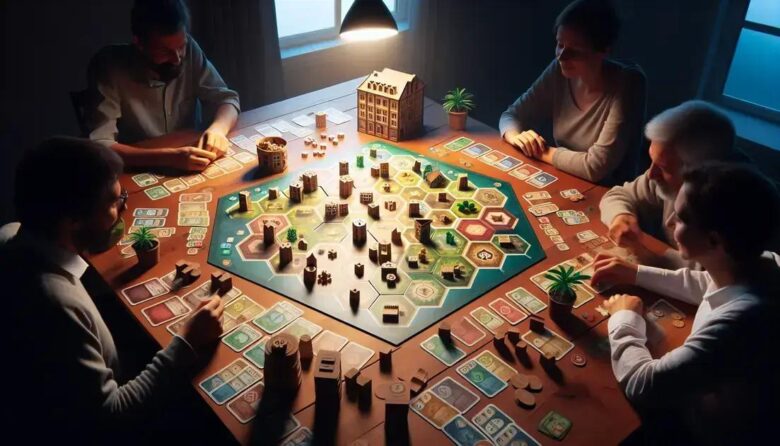The Puerto Rico 2002 board game beginner guide explains key roles, resource management, trading, and turn planning to help new players build strong strategies and avoid common mistakes for a successful gameplay experience.
If you’re diving into the world of board games, the Puerto Rico 2002 board game beginner guide can be a great help to kickstart your journey. Ever wondered how you can get ahead without getting overwhelmed? Let’s explore some practical tips and insights that help you play smarter, not harder.
understanding the game basics and objectives
The core of Puerto Rico 2002 lies in understanding its basics and objectives. Players assume roles as colonial governors, aiming to build the most prosperous settlement on the island. The game revolves around cultivating plantations, constructing buildings, and shipping goods to earn victory points.
Each turn involves selecting one of several roles like the settler, mayor, or trader, each offering unique actions. For example, the settler allows planting new crops, while the trader helps exchange goods for coins. Knowing these roles is key to progressing efficiently.
The ultimate objective is to accumulate the highest number of victory points by the end of the game, which come from buildings and successful shipments. Managing resources like crops, workers, and coins smartly aligns with winning strategies.
Remember: balancing production, workforce, and shipping activities while adapting to other players’ moves is crucial. Taking time to grasp these fundamentals sets a strong foundation for enjoying the game and improving your play.
key roles and how to use them efficiently
In Puerto Rico 2002, selecting and using roles efficiently is vital for strong gameplay. Each round, players choose roles like settler, mayor, builder, or trader, and these roles grant special actions that can shift the game’s momentum.
The settler allows you to plant new crops on your plantations, expanding production. Prioritize this role early to build a steady resource base.
The mayor lets you assign colonists to your buildings and plantations, increasing productivity. Efficiently balancing colonist placement is key to maximizing output.
The builder grants the ability to purchase buildings, which provide various benefits and victory points. Look for buildings that complement your strategy and improve resource management.
The trader enables you to sell goods for coins. Use this role to gain coins needed for building or acquiring other advantages.
Understanding when to pick each role depends on your current resources and game situation. Reacting to opponents’ choices and planning your turns around roles will give you a strategic edge.
tips for managing resources like plantations and buildings
Managing resources effectively in Puerto Rico 2002 is key to building a strong settlement. Your plantations provide the raw materials, such as corn, tobacco, and sugar, so keeping them productive is essential. Always ensure you have enough colonists assigned to work your plantations to maximize output.
Balance your plantations and buildings carefully. While plantations generate goods, buildings often increase efficiency or provide victory points. For example, some buildings allow more colonists or give bonuses in trading and shipping.
Keep an eye on your resources like coins and colonists. Spending coins wisely on buildings at the right moment can give you a big advantage. Also, avoid having too many unused buildings or empty plantations, as they waste potential.
Upgrading your plantations and building complementary structures helps create chains of production that boost your economy. For instance, a sugar plantation paired with a refinery building increases your goods’ value.
Remember: regular resource management throughout the game keeps your economy stable and sets you up for successful trading and shipping phases.
strategies for successful trading and shipping
Trading and shipping are vital for gaining coins and victory points in Puerto Rico 2002. To trade successfully, aim to produce goods that have a high trading value and match the available trading house slots. Always watch your opponents’ goods to avoid overproducing items that won’t sell.
Shipping strategies focus on filling cargo ships with your goods. Prioritize high-value goods like tobacco or coffee for shipping, as sending these can yield more victory points. Remember that the ships have limited space, so timing your shipments to avoid competition is important.
Use the trader role wisely by selling goods when you can earn the most coins, which will help you purchase buildings that enhance your economy or provide victory points. Also, the captain role is key for shipping; plan your turns to maximize shipments and gain bonuses.
Consider blocking opponents by selecting roles that limit their trading or shipping opportunities. Balancing between expanding your production and selling goods at the right time will put you ahead.
Overall, staying flexible and adapting your trading and shipping based on the game state and other players’ actions gives you the best edge.
common beginner mistakes and how to avoid them
Beginners often make mistakes that slow progress in Puerto Rico 2002. One common error is ignoring the balance between plantations and buildings, which can stall production and limit options.
Another mistake is rushing to pick roles without considering their current benefits or how opponents might react. Pay attention to timing and adapt based on the game state.
Neglecting colonist distribution is also frequent. Not assigning enough colonists to plantations or buildings reduces output and wastes potential advantages.
Additionally, beginners sometimes focus too much on one resource or good, missing opportunities in trading and shipping diverse products.
To avoid these pitfalls, focus on maintaining a balanced economy with steady production, flexible role selection, and careful colonist management. Watching experienced players and practicing strategic planning can improve your skills quickly.
how to pace your game and plan turns effectively
Effective pacing and turn planning in Puerto Rico 2002 are essential to stay competitive. Each turn, consider how your role choice impacts both your strategy and the other players. Planning a few steps ahead helps in controlling the flow of resources and actions.
Try to anticipate opponents’ moves and reserve roles that might block their plans or give you advantages. Maintaining flexibility in your strategy allows you to adapt when unexpected choices arise.
Manage your resources carefully by timing your production, building, and shipping phases. For instance, avoid overproducing goods that you cannot ship or trade efficiently in your next turns.
Use your coins and colonists wisely: invest in buildings only when you have the resources to benefit immediately, and assign colonists to the most productive locations to maximize output.
Remember, pacing means not rushing decisions but thinking about the long-term effects. A well-planned turn can set you up for multiple strong moves in future rounds, giving you a strategic edge.
Mastering Puerto Rico 2002: Your Path to Success
Understanding the game’s basics, wisely using roles, managing resources well, and planning your turns carefully can greatly improve your gameplay. Avoiding beginner mistakes and adapting your strategies to the changing game state will keep you competitive and engaged.
With practice and thoughtful play, you can enjoy the rich experience that Puerto Rico 2002 offers. Every decision matters, so take your time and make the most of each turn.
Start applying these tips today and watch yourself become a stronger, more confident player in this classic board game.




